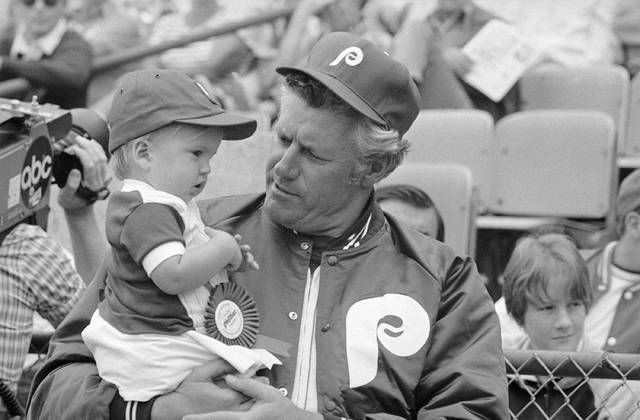Click here to subscribe today or Login.
Dallas Green, the bearish, blustering, boom box-throated manager who in 1980 whipped a talented but complacent Phillies team to the franchise’s first world championship, died Wednesday at 82, a team official confirmed.
Green spent most of his long baseball career with a Phillies organization that signed him as a Delaware high-schooler in 1955. Over the subsequent 61 years, with notable interruptions in New York and Chicago, he would pitch, coach, manage, scout, and fill a number of front-office positions for the team.
A commanding physical presence at 6-foot-5, with a thick mane of silver hair and a voice that could penetrate concrete walls, Green seemed born to lead.
As a spot-starter and reliever with the Phillies, Mets and Senators, he was a hard-throwing right-hander who never mastered his control or his temper. Green compiled a 20-22 record and a 4.26 ERA in his playing career from 1960-67.
“I was a 20-game winner,” he liked to say. “It just took me five years to do it.”
Before that career ended, he was a player/coach in the Phillies system. He coached and managed in their minor leagues until 1972, when owner Ruly Carpenter made him director of the team’s farm system.
For the rest of that decade, Green, a favored protege of general manager Paul Owens, oversaw drafts that produced what was then the greatest era in club history. With a nucleus of homegrown players, those Phillies appeared in six postseasons from 1976-83, winning five National League titles and the first World Series in their 97-year history.
With that championship 1980 team, Green earned an indelible spot in franchise history.
Manager Danny Ozark was fired in late August 1979 as the three-time defending NL East champions, led by future Hall of Famers Mike Schmidt and Steve Carlton, stumbled to a fourth-place finish. Though officially an interim replacement, Green was given a mandate to bring discipline, cohesion, and passion to a clubhouse marked by the aloof independence of its veteran core.
“The Phillies didn’t fire Danny Ozark,” Green told his players in his first day on the job, “you guys did.”
A widely unpopular choice among players, Green often barked at them in the dugout, the clubhouse, and in the papers. A team used to Ozark’s hands-off approach bristled at the new manager’s in-your-face style.
“I’m a screamer, a yeller and a cusser.” he said. “I never hold back.”
He brought up rookies to challenge veterans for playing time. He established a dress code and curfew, banned drinking on team flights, and restricted clubhouse card games.
“Any players acting unprofessionally, or embarrassing me or the club, will be fined at my discretion,” read a rule sheet the Phillies found at their Veterans Stadium lockers on Opening Day in 1980.
Players scoffed. Carlton refused to even read the manager’s regulations. Shortstop Larry Bowa complained they were being treated like high-schoolers.
“We hated him,” catcher Bob Boone said. “He was driving us crazy. But it was a relationship that worked.”
The back-and-forth between the ‘80 Phils and their manager produced newspaper headlines and some memorable explosions but fewer-than-expected victories. Then in September, something clicked.
After months of scuffling, Green’s Phillies caught fire. They clinched the division in Montreal on a wild final weekend in Montreal, captured their first pennant since 1950 in a memorably taut NL Championship Series with Houston, then defeated Kansas City in an almost anticlimactic six-game World Series.
“We challenged them every day,” a champagne-soaked Green roared amidst the championship celebration. “We wouldn’t let them slip. If my coaching staff saw something wrong, they jumped. And if they didn’t jump far enough, I jumped. We kept the pressure on the players from the time spring training started.”
Green stepped down after the strike-shortened ‘81 season and became general manager of the Chicago Cubs. Engineering the acquisition of several Phillies — including, in a historically lopsided trade, a minor league second baseman named Ryne Sandberg — Green helped Chicago win its first division title in 1984.
The Sporting News named him its executive of the year, but by 1987 Green tired of battling with Cubs executives and stepped down. Two years later, George Steinbrenner hired him as New York Yankees manager. Predictably, the two Type A personalities clashed and Green’s Bronx tenure lasted only 121 games.
In the mid-1990s, he spent four losing seasons in the New York Mets dugout before returning for good to the place he considered home, the Phillies front office. His overall managerial record was 454-478.






